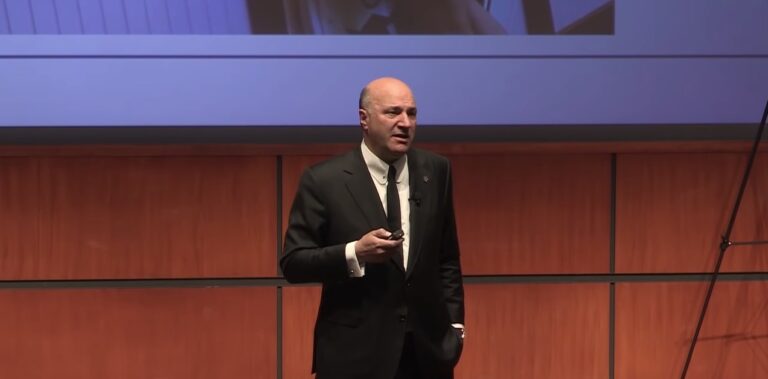
Kevin O’Leary, a well-known entrepreneur and TV personality from “Shark Tank,” spoke to CoinDesk on 3 October 2023 to share his skepticism about the readiness of major financial institutions to invest in Bitcoin. Contrary to popular belief, O’Leary stated that these institutions are not actually showing significant interest in the cryptocurrency.
O’Leary expressed doubt about the possibility of asset management firms like BlackRock and Fidelity launching the first-ever Bitcoin spot ETFs. He attributed this to the ongoing scrutiny of the cryptocurrency sector by federal agencies, particularly the U.S. Securities and Exchange Commission (SEC).
O’Leary mentioned that as long as the SEC continues to take legal actions against various entities in the crypto space, institutional investors will remain on the sidelines:
“You know, people talk about, ‘there’s great institutional interest in bitcoin.’ No, there isn’t. They don’t own any of it, and they’re not going to own it while [SEC Chair Gary] Gensler’s suing everybody.“
The SEC has been actively pursuing legal actions against key players in the cryptocurrency industry, claiming that many of the tokens being traded should be classified as unregulated securities. This has led to legal challenges for major crypto exchanges like Coinbase and Binance, both of which have faced lawsuits from the SEC for alleged regulatory violations.
O’Leary pointed out that these legal issues pose a significant hurdle for companies like BlackRock when it comes to selecting a platform for a potential ETF. He emphasized that it’s not feasible to list an ETF on an exchange that is currently facing legal action from regulatory authorities.
<!--He also noted that Binance is on a downward trajectory, with its co-founder Changpeng Zhao facing significant regulatory pressure. O’Leary questioned the wisdom of any financial institution wanting to engage with a platform under such circumstances.
O’Leary’s comments were made on the opening day of the trial involving Sam Bankman-Fried (SBF), who has been accused of mismanaging the FTX exchange, leading to its downfall last year. O’Leary suggested that the days of lax regulation and “crypto cowboys” are coming to an end. He stressed that without regulatory clarity in the U.S., the cryptocurrency industry is unlikely to grow as many hope it will.
Furthermore, O’Leary speculated that more transparent and compliant cryptocurrency exchanges might appear in other parts of the world. This could potentially divert institutional interest away from the U.S. He concluded by saying that for Bitcoin to gain value, it needs to be traded on an exchange that complies with the regulations of its jurisdiction, something that currently seems unlikely to happen in the U.S.
[embedded content]
On September 29, O’Leary appeared on Fox Business show Varney & Co., which is hosted by Stuart Varney.
Kevin O’Leary expressed significant concern about the state of digital currency regulation in the United States. He attended a recent digital currency hearing and was struck by the level of criticism aimed at SEC Chairman Gary Gensler. O’Leary described the atmosphere as one where Gensler was “fried like a chicken,” emphasizing the intensity of the scrutiny. He expressed frustration over Gensler’s approach to regulation, stating that it is causing the U.S. to lose its innovative edge in the crypto space.
O’Leary revealed an upcoming development in Abu Dhabi that could potentially shift the center of crypto innovation away from the U.S. According to him, Abu Dhabi is planning to launch a new digital currency exchange called M2. This exchange aims to be fully compliant and is backed by billions of dollars, offering transparent and stable ownership. O’Leary emphasized that M2 is designed to replace both FTX and Binance, two major exchanges that have faced regulatory hurdles in the U.S. He argued that M2 could become the new standard in digital currency exchanges, particularly because holding cryptocurrencies like Bitcoin requires an exchange for liquidity.
- SEO Powered Content & PR Distribution. Get Amplified Today.
- PlatoData.Network Vertical Generative Ai. Empower Yourself. Access Here.
- PlatoAiStream. Web3 Intelligence. Knowledge Amplified. Access Here.
- PlatoESG. Carbon, CleanTech, Energy, Environment, Solar, Waste Management. Access Here.
- PlatoHealth. Biotech and Clinical Trials Intelligence. Access Here.
- Source: https://www.cryptoglobe.com/latest/2023/10/shark-tank-star-kevin-oleary-dismisses-hopes-for-institutional-bitcoin-investment-and-spot-bitcoin-etfs/
- :has
- :is
- :not
- :where
- 2023
- 29
- a
- About
- abu dhabi
- According
- accused
- Action
- actions
- actively
- actually
- Ads
- against
- agencies
- aimed
- aims
- All
- alleged
- also
- an
- and
- any
- appear
- appeared
- approach
- ARE
- argued
- AS
- asset
- asset management
- At
- Atmosphere
- Authorities
- away
- backed
- Bankman-Fried
- BE
- because
- become
- been
- being
- belief
- Betting
- billions
- binance
- Bitcoin
- BlackRock
- both
- business
- by
- called
- causing
- Center
- Chair
- chairman
- challenges
- Changpeng
- Changpeng Zhao
- circumstances
- claiming
- clarity
- classified
- CO
- Co-founder
- coinbase
- Coindesk
- comes
- coming
- comments
- commission
- Companies
- compliant
- Concern
- concluded
- content
- continues
- contrary
- could
- criticism
- crypto
- Crypto Exchanges
- crypto space
- cryptocurrencies
- cryptocurrency
- Cryptocurrency Exchanges
- Cryptocurrency Industry
- CryptoGlobe
- Currency
- Currently
- day
- Days
- described
- designed
- Development
- Dhabi
- digital
- digital currency
- digital currency exchange
- divert
- dollars
- Dont
- doubt
- downfall
- downward
- Edge
- embedded
- emphasized
- emphasizing
- end
- engage
- entities
- Entrepreneur
- ETF
- ETFs
- Ether (ETH)
- everybody
- exchange
- Exchange Commission
- Exchanges
- expressed
- faced
- facing
- feasible
- Federal
- fidelity
- financial
- financial institution
- Financial institutions
- firms
- first-ever
- For
- fox
- Fox Business
- from
- frustration
- FTX
- FTX Exchange
- fully
- Gain
- Gary
- Gary Gensler
- Gensler
- going
- gone
- great
- Grow
- happen
- Have
- he
- hearing
- him
- his
- holding
- hope
- hosted
- HTTPS
- Hurdles
- in
- In other
- industry
- Innovation
- innovative
- Institution
- Institutional
- Institutional Interest
- institutional investors
- institutions
- interest
- Invest
- Investors
- involving
- issues
- IT
- ITS
- jpg
- jurisdiction
- kevin o'leary
- Key
- Know
- Last
- Last Year
- launch
- launching
- Lawsuits
- leading
- Led
- Legal
- Legal Action
- Legal issues
- Level
- like
- Liquidity
- List
- Long
- lose
- M2
- made
- major
- management
- many
- mentioned
- might
- more
- needs
- New
- no
- noted
- october
- of
- offering
- on
- ONE
- ongoing
- opening
- Other
- out
- over
- own
- ownership
- particularly
- parts
- People
- Personality
- planning
- platform
- plato
- Plato Data Intelligence
- PlatoData
- players
- Popular
- possibility
- potential
- potentially
- pressure
- pursuing
- Questioned
- Readiness
- recent
- Regulation
- regulations
- regulatory
- remain
- replace
- requires
- Revealed
- s
- Sam
- Sam Bankman-Fried
- Sam Bankman-Fried (SBF)
- saying
- sbf
- Screen
- screens
- scrutiny
- SEC
- sec chair
- SEC chairman
- SEC chairman Gary Gensler
- sector
- Securities
- Securities and Exchange Commission
- seems
- selecting
- September
- Share
- shift
- should
- show
- showing
- significant
- sizes
- Skepticism
- something
- Soon
- Space
- Spot
- stable
- standard
- State
- stated
- States
- stating
- such
- T
- Take
- Talk
- tank
- that
- The
- The State
- the world
- There.
- These
- they
- this
- to
- Tokens
- traded
- trajectory
- transparent
- trial
- tv
- two
- u.s.
- U.S. Securities
- U.S. Securities and Exchange Commission
- U.S. Securities and Exchange Commission (SEC)
- under
- United
- United States
- unlikely
- upcoming
- use
- value
- various
- Violations
- wanting
- was
- well-known
- were
- when
- which
- while
- WHO
- why
- will
- wisdom
- with
- without
- world
- year
- youtube
- zephyrnet
- Zhao












